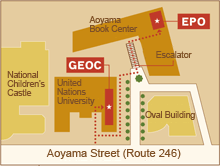A network of youth who are fighting climate change is expanding fast. The youth presence at the 2009 UNFCCC COP15 (Fifteenth Session of the Conference of Parties to the United Nations Framework Convention on Climate Change in Copenhagen, Denmark) reached over 1,000 people, representing around 100 countries. Many of the youth from around the world collaborate and hold campaigns in an effort to get the voice of the next-generation reflected in the negotiations. There is now an official seat for the youth at the conference.
In 2009 a new youth constituency called the YOUNGO (YOUTH NGO) was established within UNFCCC. The constituency came to exist as a result of the hard and voluntary work put in by the youth in building a youth network.
The development of the network
How did they create the network?
In the late 1980s, groups of students, young environmentalists and young environment researchers started to form, mainly in the developed countries, but there were no means to build an inter-country network. In 1997 when the Kyoto Protocol was signed at COP3 (Kyoto), groups from Japan, North American and Europe launched a joint campaign by communicating through FAX and international telephone calls. After the conclusion of COP3, however, the network showed no sign of continuing or expanding. The turning point was in 2005 at COP11 (Montreal, Canada) when young people, mainly from North America, communicated using E-mail and instant messenger to organize the first COY (Conference of Youth). Since then, the youth has voluntarily held COY every year. COY was organized with a platform that allowed any young person attending the international conference on climate change, such as environmental student groups, young researchers, young environmentalists or young people simply interested in the topic, to also attend COY. Participants grew mainly in the region of the host countries, such as African, Asia, Europe and South America, and so did the network.
The understanding with the UNFCCC Secretariat
The youth organized their constituency by establishing management rules and a system for deciding on focal points. They then approached the UNFCCC Secretariat and requested an official seat for the youth at the conference.
The timing was perfect. Just then, the UNFCCC Secretariat was looking into structures for reflecting the youth’s opinion and an effective way to involve the youth in the negotiations as the effects of climate change on the future generations are becoming increasingly severe. Following a period of negotiation, an understanding was reached between the UNFCCC Secretariat and the youth network, and YOUNGO was established officially at COP15.

Youth-specific unique activities
Their campaigns are very unique.
Here are some examples…
Many of the young people wore a T-shirt written “How old are you in 2050?” at the COP preparation committee. They communicated the message that the negotiators were there not only to decide on their country’s short-term benefits but the future of the world. The message was clear: remember that the decisions they make affect the future of all the young people in the world.
In a unique campaign named Project Survival, the youth worked mainly with government officials from the Island States. The Island States are facing the negotiations with the idea that climate change will greatly affect their livelihood as water levels increase and their citizens may be forced to become environmental refugees. The understanding of the gravity of the situation for securing a livable future resonates with that of the youth. Young people from all around the world stepped up to help the Island States’ negotiations and worked hard supporting the government delegations by taking copies and preparing presentation materials.

Points on the network
The use of IT
The youth constituency fully utilizes the latest IT systems in their work. Wiki and skype are used to hold meetings, share information and to ensure decisions are made without bias. Campaigns are organized with the skillful use of the latest social media platforms such as Youtube and Twitter which has led to the successful involvement of young people around the world who were not physically present at the negotiations to participate in the cause.
Solidarity
The international climate change negotiations are probably experiencing the most difficulty in the UN as it is closely tied with all countries’ national gain and interest. Despite how the international negotiations are practically breaking down, the youth group solidarity is strong. This is because they come together as the generation that will face the effects of climate change and want nothing but to stop its progression. The secret to their solidarity is that there is no aid money and all the young people, wherever they may be from, are equals.

The young people in the network who come together beyond boarders in an effort to change society will surly carry their experience into their professional lives even after graduating the youth group. We look forward to seeing these activities expand further and more active.
Reference: http://unfccc.int/cc_inet/cc_inet/youth_portal/items/6795.php
http://youthclimate.org/about_youth_climate/youngo-unfccc/
Category
Project cooperation/project accord, Network
Theme
Project cooperation/project accord
Actor
Youth Groups
Partners
The UNFCCC Secretariat

















